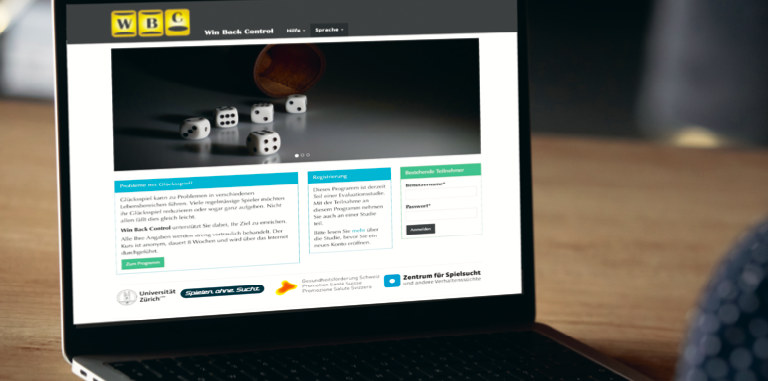
Gambling: help online
Mar. 2021Behavioural addictions
The “Win Back Control” project is developing a web-based self-help programme that gamblers can use to get their gambling habit under control. The online programme, which can be used anonymously, is a further counselling option that rounds out the services offered by the cantonal counselling centres.
Anyone wishing to play for money in this country is spoilt for choice. Switzerland has 21 casinos and 9,000 sales outlets for lottery tickets. “This makes Switzerland a country with one of the highest densities of gambling opportunities in the world,” says Michael Schaub, scientific head of the Swiss Institute for Addiction and Health Research. There are about 180,000 people in Switzerland with high-risk gambling behaviour; almost 15,000 people are classified as addicted to gambling. Yet many of those affected hesitate to seek advice. “We estimate that ten per cent of gambling addicts, at most, are receiving therapy,” Schaub says. “Many don’t go to a counselling centre until they have suffered a major crisis.” Moreover, surveys of gamblers have shown that most of them want to resolve their problem on their own.
Less money and less time
This is the starting point for Schaub’s “Win Back Control” project. It is being financed by organisations including the Prevention in Healthcare (PiH) project founding, which is part of the National Addiction Strategy. “We’ve developed a web-based self-help platform and are now running a controlled, randomised study to test whether it can help gamblers to spend less money and less time on gambling,” Schaub explains.
The researchers working with Schaub plan to enrol in the study a total of 352 regular gamblers who want to reduce their gambling activity or give it up altogether. “Recruitment is now going well,” Schaub says. So far more than 300 people have shown an interest in taking part voluntarily in the study. A randomisation system will determine whether they are given a self-help manual for reducing gambling that was developed in Canada and has been shown to work, or are assigned to the “Win Back Control” programme.
If they join the programme, they will be welcomed to the online platform by Deborah. This imaginary character is an e-coach who motivates participants to keep a gambling diary and complete between five and nine different modules during the eight-week programme. The content of the modules is derived from similar web-based tools that Schaub and his team developed several years ago for cannabis and alcohol users. These modules teach gamblers strategies and techniques for resisting temptation, for example, or for getting back on track if they fall by the wayside.
Effective in the longer term too?
Five basic modules are designed for all participants, and four supplementary modules cover additional topics that are often associated with gambling, such as anxiety disorders, depression or excessive alcohol consumption or smoking. Depending on the answers that participants give at the start of the study, e-coach Deborah suggests to them that they should complete the supplementary modules that are appropriate for them in addition to the basic modules.
The researchers will carry out a concluding survey after the participants have completed the programme to see whether the eight-week programme is still modifying their behaviour six months after it ended. Several studies in other countries such as Finland and Canada have shown that online interventions can also be effective in the longer term. “But our study is the first of its kind in Switzerland,” Schaub says.Schaub describes the online self-help programme as an “additional module in the healthcare system” that doesn’t compete with but rather complements the services offered by the cantonal counselling centres for gambling addicts. The programme is available anywhere and at any time and can also be used anonymously. According to Schaub, that makes it more likely to appeal to gamblers who so far have been at risk of falling through the net.He hopes that “Win Back Control” will pass the test. If it does, the programme – currently available in German and French – will be translated into Italian as well. And the professionals working at the cantonal counselling centres will be trained to use the self-help offering in their work. “For a long time psychotherapists and psychiatrists were very much against my ideas for web-based offerings,” Schaub says, “but that changed as a result of the COVID-19 pandemic.” The future belongs to something known as blended counselling, which adds online elements to face-to-face counselling.




